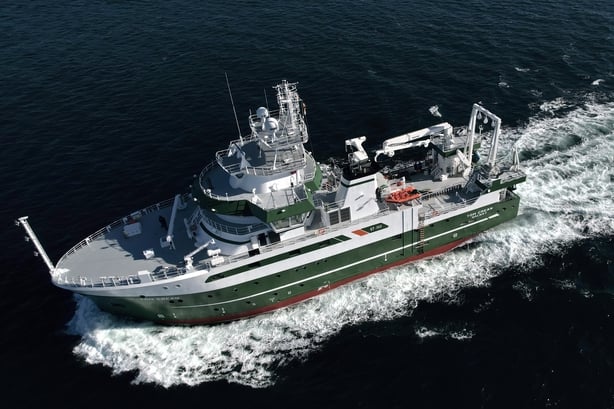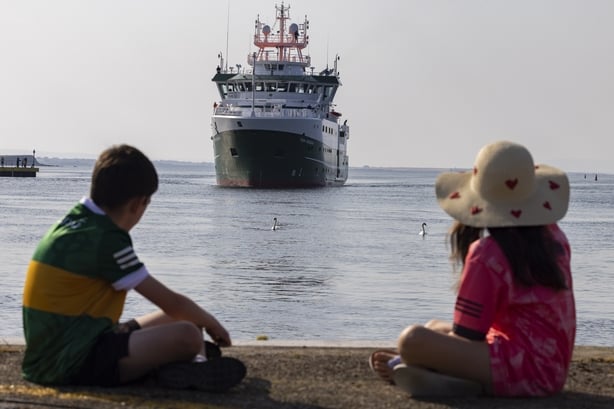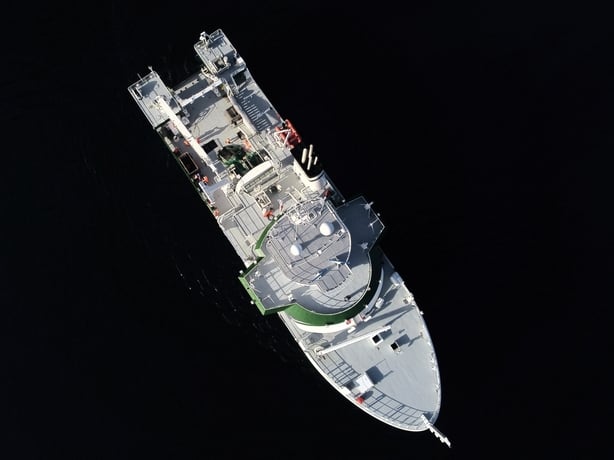Ireland's new research vessel, the RV Tom Crean has been commissioned into service in Dingle, Co Kerry.
It is named after the Irish explorer, a native of Annascaul, Co Kerry who undertook three ground-breaking expeditions to the Antarctic in the early 20th Century.
The RV Tom Crean will allow scientists here to undertake research to support projects outlined in the Programme for Government including fisheries assessment, offshore renewable energy, marine spatial planning, marine protected areas and addressing the challenges of climate change.
The 52.8m vessel is capable of operating in the rough seas of the Irish Exclusive Economic Zone (EEZ), and support increased research in the Atlantic Ocean.
It was taken into ownership by the Marine Institute earlier this year before taking its maiden voyage to its home port of Galway, arriving there on 18 July.
Funded by the Department of Agriculture, Food and the Marine the total build cost of the RV Tom Crean is estimated at €25 million over four years.
It will replace the RV Celtic Voyager, Ireland's first purpose-built research vessel, which was launched in 1997.

The RV Tom Crean makes much less underwater noise than traditional vessels, reducing the effect of noise on fish populations while surveying and sampling, so that a more accurate stock assessment can be made.
The vessel will carry out a wide range of marine research activities including expanded fisheries and deep sea surveys, environmental monitoring, climate change related research, seabed mapping and marine spatial planning. It will also be used to maintain and deploy weather buoys, observational infrastructure and our Remotely Operated Vehicle (ROV) Holland I.
Speaking at the commissioning in Dingle Harbour Minister for Agriculture, Food and the Marine, Charlie McConalogue said: "I don't need to remind anyone here today that Ireland's oceans are vital to our economy, our environment, and many aspects of our daily lives.
"The RV Tom Crean will undertake essential scientific work, which will support many of the projects outlined in the Programme for Government; including fisheries assessments (so crucial to our coastal communities), food security, offshore renewable energy, marine spatial planning, marine protected areas and assist the State in addressing the challenges of climate change."

The vessel will be at sea for 300 operational days each year, for at least 21 days at a time, scientists said, addind that it aims to accommodate up to 3,000 scientist days annually.
"We are delighted to name our new research vessel after Tom Crean as it gives recognition to an Irish explorer of international renown whose life was packed with amazing feats of Antarctic bravery, determination and courage," Dr Paul Connolly, CEO of the Marine Institute, said.
"The Institute appreciates the support of the descendants of Tom Crean in this decision.
"Our new multi-purpose research vessel will enhance Ireland’s capacity to undertake international collaborative research to acquire the ocean data and knowledge essential to managing our vast marine resources.
"The ocean is essential to life on earth. It produces half the oxygen we breath and is a major driver of our weather. We need the best quality data, science and advice to inform decisions on the big challenges facing society – mitigating the impacts of climate change, protecting and restoring ocean biodiversity, and realising the full potential of our ocean economy."

The Marine Institute said the vessel design incorporates the latest proven technologies to ensure that it operates as efficiently as possible, with reduced fuel consumption and minimising the vessel’s environmental impact and carbon footprint.
